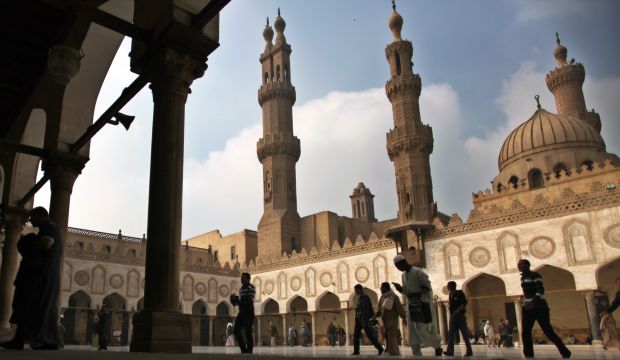
Muslims arrive to attend the Friday prayer at Al-Azhar mosque in Cairo, Egypt, on December 28, 2012 (AP Photo/Khalil Hamra, File)
The campaign by the Dar Al-Ifta, seen as one of the world’s foremost authorities advising Muslims on spiritual and life issues, adds to the war of words by Muslim leaders across the world targeting the Islamic State of Iraq and Syria (ISIS), which controls wide swaths of both countries. Its violent attacks, including mass shootings, the destruction of Shi’a shrines, the targeting of minorities, and beheadings—including American journalist James Foley—have shocked Muslims and non-Muslims alike.
The Grand Mufti of Egypt, Shawqi Allam, previously said the extremists violated all Islamic principles and laws and described the group as a danger to Islam as a whole. Now, the Dar Al-Ifta he oversees will suggest foreign media drop the name “Islamic State” or ISIS in favor of “Al-Qaeda Separatists in Iraq and Syria,” or “QSIS,” said Ibrahim Negm, an adviser to the mufti.
This is part of a campaign that “aims to correct the image of Islam that has been tarnished in the West because of these criminal acts, and to exonerate humanity from such crimes that defy natural instincts and spread hate between people,” Negm said, according to Egypt’s state news agency MENA. “We also want to reaffirm that all Muslims are against these practices which violate the tolerant principles of Islam.”
Egypt’s President Abdel-Fattah El-Sisi also weighed in. On Sunday, speaking to editors of Egyptian newspapers, he said the extremist group was part of a plot aiming to “undermine Islam as a belief.”
He said the current religious discourse in the region only feeds “minds that believe that killing and bloodshed is the way to defend Islam,” in comments carried by MENA.
Sisi has been a champion of advancing moderate Islam, building his power base in the chaotic region since he ousted Islamist president Mohamed Mursi on vows to crush extremist Islam.
The mufti’s adviser Negm said the Internet and social media campaign will include opinions by Islamic scholars from around the world about the group and its claims to represent Islam. It also will include a hashtag campaign on Twitter and videos from Muslims denouncing the group and its methods.
The Grand Mufti of Saudi Arabia, Sheikh Abdulaziz Al-Sheikh, had also called the group Islam’s No. 1 enemy. The world’s largest bloc of Islamic nations, the Organization of Islamic Cooperation, said Saturday that the actions of the group, including Foley’s beheading as well as the targeting of minorities, have nothing to do with the values of Islam. The 57-member state group is based in Saudi Arabia.
Muslims around the world have battled against the backlash that followed the rise of Al-Qaeda and the terrorist attacks of September 11, 2001 in the US. Scholars and activist groups have sought for years to disassociate themselves from militants touting their own extremist versions of Islam.
They say ISIS is another, one that appears more ambitious and aggressive than Al-Qaeda. The group renamed itself the “Islamic State” on June 29 when it unilaterally declared the territory it held in Iraq and Syria a caliphate, effectively erasing the two countries’ borders and setting up a proto-state governed by its own strict interpretation of Shari’a law.
Since June 29, The Associated Press has referred to the extremists’ organization as the Islamic State group or its combatants as Islamic State fighters. Many other media organizations did the same, while some refer to it by its previous name.
The group has a sophisticated media and Internet-based campaign that has drawn in foreign fighters, which may explain why Islamic scholars chose to adopt a similar approach. But it’s unclear how successful this latest push against the group will be.
Dar Al-Ifta is famed among scholars of Islamic jurisprudence and has offered training to many Muslims from around the world since the late 1800s. But its opinions are advisory and are often viewed as too close to official government positions.

Trackbacks/Pingbacks